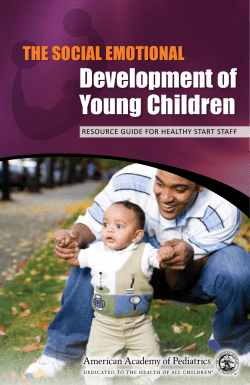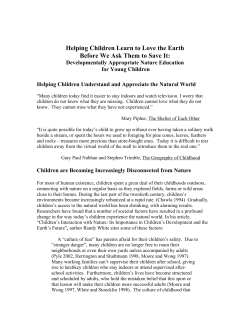
Document 64101
664 journal of social history many thousands away. Thirty years later, free compulsory education, and hamlet schools, had changed this radically. Of this evolution Gildea, clearly, is well aware. Some of his readers, though, may miss the wood for the trees. Whatever they do, though, they will not regret venturing into the luxuriant landscape he has etched for us, where the teeming abundance of an English garden replaces the linear vistas of a jardin a la francaise. University of California, Los Angeles Eugen Weber Forgotten Children: Parent-Child Relations from 1500-1900. By Linda A. Pollock (Cambridge: Cambridge University Press, 1983. xi + 334 pp.). Downloaded from http://jsh.oxfordjournals.org/ by guest on August 22, 2014 This is an exceedingly interesting book, which deserves to be read by anyone interested in the history of childhood in Western society. The book discusses key features of parent-child relations, including the concept of childhood itself, methods of childrearing from infancy onward, and discipline, largely on the basis of diary discussions by parents. The diaries (supplemented at points by newspaper materials) are drawn from Britain and North America. The author provides an intelligent assessment of the nature of her evidence, in which many objections are anticipated, and also a review of the dominant thesis of the history of childhood as it emerged from the work of Philippe Aries, David Hunt and others. The author's conclusion is arresting: there have been few serious changes in the nature of parental reactions or of childhood during the four centuries covered. Aries was wrong. While the notion of childhood did become somewhat more abstract from the 17th century onward, and while a few aspects of discipline or physical care did change, the continuities overwhelm these vagaries. People knew what childhood was well before the 17th century. Brutalities and will-breaking extremes were rare even in groups and periods most often pinpointed. This thesis demands consideration. It is also true that collective diary evidence constitutes a much-needed next step in family history of this sort. But I must confess a sense of "not proved" at the book's conclusion. Diary evidence turns out to deal rather sketchily with childhood, which helps account for the fact that almost half this book simply works up to the substantive section. Many aspects of childhood do not seem to have been widely discussed at all. Disparities between the relatively benign tone of diary accounts and known differences, such as the schoolroom environment, are noted in this treatment but not explained very persuasively; for comments on schoolroom harshness might reflect a greater willingness to describe honestly than the home environment could inspire. There is no effort, either, to integrate what we know about wetnursing in the period. Philip Greven's work on varieties of childrearing in 18th century America is noted approvingly but not really used, for the author's approach does not really support serious variations in childrearing styles; and yet there is no confrontation with Greven's findings. Pollock's revisionism suffers from two other weaknesses. First, her diary evidence and related accounts of childhood experience bunch in the 18th century. There is some material from earlier periods, but not enough to offer a really balanced chronological treatment. Yetfavorable accounts of childhood and an emphasis on affection are what we would expect from the 18th century; perhaps Pollock mainly demonstrates (what would not be surprising) that there were scattered anticipations of 18th-century reactions earlier. Second, Pollock suffers from an inflexible definition of love and affection. Having shown that 'coldness cannot uniformly describe premodern emotional reactions to children, she does not consider the possibility that affect may nevertheless have REVIEWS 665 Carnegie-Mellon University Peter N. Steams Gerontologie und Sozialgeschichte, ~ge zu einer historischen Betrachtung des Alters. Edited by Christoph Conrad and Hans-Joachim von Kondratowitz (Berlin: Deutsches Zentrum flir Altersfragen, 1983. iv plus 523 pp. DM 11.(0). These eighteen papers and three commentaries stem from an interdisciplinary conference on gerontology and social history in Berlin, July 1982. The contributors are all German-speaking Central Europeans, and all the historical papers concern this geographic area. There is an English summary and a very useful international bibliography. The papers aim at stimulating research on the social history of old age in Germany, rather than at presenting any firm conclusions about it, and at integrating it within the general history of the life-course and broader historical concerns, lest it become merely a trendy, trival sub-field of Alltagsgeschichte. The concurrent desire to make it relevant to gerontological and political concerns may sometimes work against this, but is unavoidable. A theme common to many of the papers is that there never was a golden era of family old-age care to which we might return once Social Security collapses or is dismantled by neo-conservatives. Ethnologist Rudolf Schenda suspects that most authentic folklore depicts old age as miserable and contemptible. Gudrun Wedel emphasizes the disadvantaged, often humiliatingly-dependent position of unmarried older women in a society which restricted them to nursing sick and aged relatives without guaranteeing them similar care for their old age. Thomas Held finds that in rural Austria only about ten percent of the old enjoyed the relatively comfortable retirementbenefitsof the peasant Ausgedinge. Josef Ehmer's analysisof urban household censuses for Central and Southern Europe shows that most old persons have lived Downloaded from http://jsh.oxfordjournals.org/ by guest on August 22, 2014 changed over time, in intensity, manifestation, even basic nature. In this, Pollock is as bound by an all-or-nothing approach to love as the historians she criticizes. It is clear that many accounts have needlessly exaggerated distinctions between modem and premodern childhood, among other things taking "official" pronouncements too literally. Linda Pollock is surely right in calling for a reconsideration of these extremes based in part on a willingness to accept more continuity and simply more subtlety in the discussion of evolution over time. But I doubt that Pollock's retrospective optimism should be taken as a final word, so much as a step in the maturation of this complex and fascinating subject. Without question, Pollock fails to encompass changes in the extra-familial environment of childhood, despite some effort, or the experience of the lower classes (including the nature of apprenticeships). To this extent, the assumption of continuity most definitely must be tested further. Even within the middle-class home, where Pollock's evidence concentrates, legitimate issues remain, including the need to work for a still-wider range of evidence. Among other things, it will be important to juxtapose diary evidence with childrearing patterns known from other sources, simply to test the honesty of the accounts. For example, Pollock uses diaries to downplay the idea of wetnursing; yet there are other ways to know about wetnursing, and in this case reliance on the single basic source is needlessly simplistic. But while Forgotten Children claims too much, it contributes considerably as well. Those of us still convinced that childrearing patterns really do change over time have a greater challenge before us as a result of this study.
© Copyright 2025





















